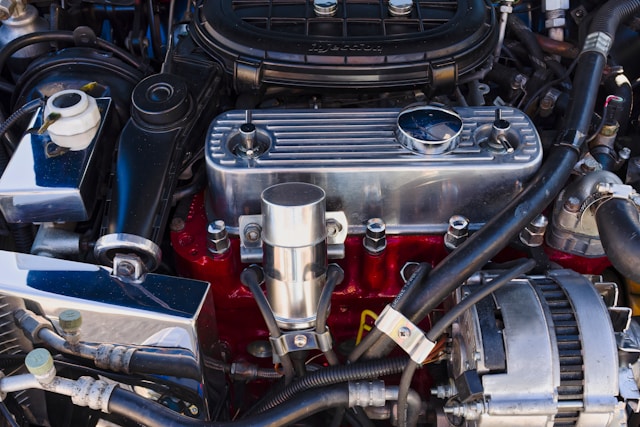When your vehicle’s alternator begins to fail, you’re faced with an important decision that can significantly impact both your wallet and your car’s long-term performance. Whether to rebuild your existing alternator or replace it entirely depends on various factors including cost, time constraints, and the overall condition of your vehicle. This comprehensive guide examines the advantages and disadvantages of each option to help Auckland motorists make an informed choice.
Rebuilding Your Alternator: The Benefits
Cost Savings
Rebuilding an alternator typically costs between 40% to 60% less than purchasing a brand new unit, making it an attractive option for budget-conscious vehicle owners in Auckland. The process involves replacing worn components such as bearings, brushes, voltage regulators, and diodes whilst keeping the original housing and core components intact. For many older vehicles where parts are becoming scarce or expensive, rebuilding can offer substantial savings without compromising on quality when done properly.
The labour costs associated with rebuilding are often lower than replacement as well, particularly if you’re working with an experienced auto electrician who can perform the rebuild in-house. This approach eliminates markup on new parts and reduces the overall expense of getting your vehicle back on the road. Many Auckland workshops specialise in alternator rebuilding, offering warranties that rival those of new units whilst keeping costs manageable for everyday motorists.
Environmental Considerations
Choosing to rebuild your alternator significantly reduces automotive waste and supports environmental sustainability efforts throughout Auckland. Rather than discarding the entire unit, rebuilding preserves the majority of the original alternator’s components, requiring only the replacement of worn parts. This process reduces the demand for raw materials and manufacturing resources needed to produce entirely new alternators.
The carbon footprint associated with rebuilding is considerably smaller than manufacturing and shipping new alternators from overseas suppliers. By keeping existing components in circulation, you’re contributing to a circular economy that benefits both local businesses and the environment. Many auto electricians in Auckland have embraced rebuilding as part of their commitment to sustainable automotive practices.
Maintaining Original Equipment Specifications
When you rebuild your original alternator, you maintain the exact specifications designed for your vehicle by the manufacturer. This ensures perfect fitment and compatibility with your car’s electrical system, eliminating potential issues that can arise from aftermarket replacements. Original equipment alternators are specifically calibrated for your vehicle’s electrical demands, and rebuilding preserves these precise specifications.
For classic car enthusiasts and owners of vintage vehicles in Auckland, rebuilding often represents the only viable option to maintain authenticity. Finding new alternators for older vehicles can be challenging or impossible, making rebuilding essential for preserving these vehicles’ original character and functionality. Expert rebuilders can restore alternators to factory specifications, ensuring your classic car maintains its period-correct components whilst delivering reliable performance.
Rebuilding Your Alternator: The Drawbacks
Time Requirements
The rebuilding process typically takes longer than a straightforward replacement, which can be inconvenient for drivers who rely on their vehicles daily. Depending on the complexity of the rebuild and parts availability, the process can take anywhere from one to three days. This extended timeframe might not suit Auckland commuters who need their vehicles for work or family commitments.
If specialised parts need to be ordered, particularly for imported or less common vehicles, the waiting period can extend even further. Some components might need to be sourced from overseas suppliers, adding weeks to the rebuild timeline. During this period, you’ll need to arrange alternative transportation, which can add unexpected costs and complications to what initially seemed like a cost-effective solution.
Limited Warranty Coverage
Rebuilt alternators typically come with shorter warranty periods compared to new units, often ranging from 90 days to one year. This limited coverage reflects the inherent uncertainty in rebuilding, where some original components remain in use despite potentially being near the end of their service life. While reputable rebuilders test their work thoroughly, the mixing of new and old components can create reliability concerns.
The warranty terms for rebuilt alternators might also include more restrictions and conditions than those for new units. Some warranties only cover the replaced components rather than the entire alternator, potentially leaving you vulnerable to failures in unreplaced parts. This limited protection requires careful consideration, especially if your vehicle has high mileage or you plan to keep it for several more years.
Quality Variability
The success of an alternator rebuild depends heavily on the skill and experience of the technician performing the work. Not all auto electricians in Auckland have the same level of expertise in rebuilding alternators, and quality can vary significantly between service providers. Poor workmanship or the use of substandard replacement parts can result in premature failure and additional repair costs.
Some internal components might have hidden damage or wear that isn’t immediately apparent during the rebuilding process. These underlying issues can lead to unexpected failures even after a seemingly successful rebuild. Without replacing all components, there’s always a risk that unreplaced parts will fail shortly after the rebuild, negating any initial cost savings.
Replacing Your Alternator: The Advantages
Comprehensive Warranty Protection
New alternators typically come with warranties ranging from two to five years, providing peace of mind and financial protection against defects or premature failure. These comprehensive warranties often include both parts and labour coverage, ensuring you won’t face unexpected repair costs during the warranty period. Many manufacturers also offer nationwide warranty support, valuable for Auckland residents who travel frequently throughout New Zealand.
The warranty terms for new alternators are generally straightforward with fewer exclusions and conditions compared to rebuilt units. This comprehensive coverage reflects manufacturers’ confidence in their products and provides valuable protection for your investment. Some premium alternator brands even offer lifetime warranties, though these typically come at a higher initial cost.
Immediate Availability and Installation
Replacing your alternator with a new unit is typically the fastest solution, with most common alternators readily available from Auckland suppliers. Installation can often be completed within a few hours, minimising vehicle downtime and getting you back on the road quickly. This speed is particularly valuable for commercial vehicles or daily drivers where time off the road translates to lost productivity or income.
Modern supply chains ensure that even alternators for less common vehicles can usually be sourced within 24 to 48 hours from Auckland warehouses. Many auto electricians maintain stock of popular alternator models, enabling same-day replacement for common vehicle makes and models. This immediate availability eliminates the uncertainty and delays that can accompany rebuilding projects.
Latest Technology and Improvements
New alternators incorporate the latest technological advances and manufacturing improvements that might not have been available when your original alternator was produced. These updates can include more efficient voltage regulation, improved cooling designs, and enhanced durability features. Modern alternators often deliver better fuel economy through improved efficiency, providing long-term savings beyond the initial purchase.
Manufacturers continuously refine their designs based on field experience and failure analysis, meaning new alternators often address known weaknesses in earlier models. These improvements can result in longer service life and more reliable performance, particularly important for Auckland’s varied driving conditions from stop-start city traffic to motorway cruising. Updated designs might also better accommodate modern electrical demands from features like LED lighting conversions or aftermarket accessories.
Replacing Your Alternator: The Disadvantages
Higher Initial Cost
The most significant drawback of alternator replacement is the substantially higher upfront cost compared to rebuilding. New alternators can cost anywhere from $400 to $1,500 or more, depending on your vehicle make and model. For luxury or European vehicles common in Auckland, these costs can be even higher, sometimes exceeding $2,000 for genuine OEM parts.
Beyond the part cost itself, you’ll also face installation charges and potential programming or calibration fees for modern vehicles with smart charging systems. These additional expenses can push the total replacement cost well beyond what many vehicle owners budget for routine maintenance. For older vehicles with lower market values, the cost of a new alternator might represent a significant percentage of the car’s worth, making replacement economically questionable.
Compatibility Concerns with Aftermarket Options
While aftermarket alternators are generally less expensive than genuine parts, they can present compatibility issues with some vehicles. These units might not match the exact specifications of your original alternator, potentially causing charging problems or warning lights. Some aftermarket alternators might physically fit but deliver different amperage outputs, leading to battery problems or inadequate power for your vehicle’s electrical systems.
Quality varies significantly among aftermarket manufacturers, with some producing excellent alternatives to OEM parts whilst others offer substandard products that fail prematurely. Without extensive research or professional guidance, choosing the right aftermarket alternator can be challenging for Auckland vehicle owners. Poor quality aftermarket alternators might also generate more noise or vibration than original equipment, affecting your driving experience.
Factors to Consider When Making Your Decision
Vehicle Age and Value
The age and market value of your vehicle play crucial roles in determining whether rebuilding or replacement makes more financial sense. For vehicles less than five years old or those still under warranty, replacement with genuine parts often provides the best long-term value and maintains your vehicle’s warranty status. These newer vehicles benefit from the latest alternator technology and the comprehensive warranty protection that comes with new components.
Conversely, for older vehicles with lower market values, rebuilding can offer a cost-effective solution that extends the vehicle’s life without over-investing in repairs. Many Auckland motorists with vehicles worth less than $5,000 find that rebuilding provides adequate reliability without the financial burden of new parts. The decision becomes particularly clear when the cost of a new alternator approaches or exceeds 20% of the vehicle’s value.
Classic and collectible vehicles represent a special category where rebuilding often takes precedence regardless of cost. Maintaining originality and authenticity is paramount for these vehicles, making rebuilt original components more valuable than modern replacements. Auckland’s active classic car community often relies on skilled rebuilders to keep their vehicles running whilst preserving their historical integrity.
Driving Patterns and Requirements
Your typical driving patterns and reliability requirements should influence your decision between rebuilding and replacement. If you primarily use your vehicle for short trips around Auckland with backup transportation available, a rebuilt alternator might provide sufficient reliability at a lower cost. The occasional inconvenience of a potential failure might be acceptable given the significant cost savings.
However, if you regularly drive long distances, rely on your vehicle for work, or frequently travel to remote areas of New Zealand, the reliability of a new alternator becomes more valuable. The comprehensive warranty and reduced failure risk of new components provide essential peace of mind for critical transportation needs. Commercial vehicle operators and those who transport family members regularly often find that the additional cost of replacement is justified by the enhanced reliability.
Consider also your vehicle’s electrical demands from accessories and modifications. Vehicles with aftermarket sound systems, additional lighting, or other electrical accessories might benefit from a new alternator with updated specifications and higher output capacity. Modern alternators are often better equipped to handle these additional loads whilst maintaining efficient operation.
Long-term Ownership Plans
Your intended ownership duration significantly impacts the rebuild versus replace equation. If you plan to keep your vehicle for several more years, investing in a new alternator with comprehensive warranty coverage might provide better value over time. The extended warranty period and improved reliability reduce the likelihood of facing another alternator repair during your ownership.
For vehicles you intend to sell within the next year or two, rebuilding might offer adequate reliability whilst minimising your repair investment. Potential buyers typically don’t distinguish between rebuilt and new alternators if the vehicle is running properly, making the lower-cost rebuild option more attractive for pre-sale repairs. However, keeping repair receipts and warranty documentation can help demonstrate proper maintenance to prospective buyers.
Making the Right Choice for Your Situation
Cost-Benefit Analysis
Performing a thorough cost-benefit analysis helps clarify the best option for your specific situation. Calculate not just the immediate repair costs but also potential future expenses, downtime costs, and the value of warranty protection. Factor in your vehicle’s remaining useful life, your financial situation, and your tolerance for potential reliability issues.
Consider obtaining quotes for both rebuilding and replacement from reputable Auckland auto electricians. These quotes should include all associated costs such as labour, testing, and any additional parts that might be needed. Compare these costs against your vehicle’s value and your budget constraints to make an informed decision. Remember that the cheapest option isn’t always the most economical in the long term.
Don’t forget to factor in indirect costs such as towing, rental cars, or lost productivity if your vehicle fails unexpectedly. These hidden expenses can quickly erode any initial savings from choosing the cheaper rebuild option. A new alternator’s reliability and warranty protection might justify its higher cost when these factors are considered.
Finding the Right Service Provider
Whether you choose rebuilding or replacement, selecting a qualified auto electrician is crucial for successful repair. Look for Auckland workshops with specific experience in alternator repairs and positive customer reviews. Established businesses with proper warranties and guarantees provide better protection for your investment than cheaper operators who might cut corners.
Ask potential service providers about their testing procedures, warranty terms, and the quality of parts they use. Reputable auto electricians will gladly explain their processes and provide clear warranty documentation. They should also offer diagnostic services to ensure the alternator is actually the problem before proceeding with repairs, as electrical issues can sometimes mimic alternator failure.
Request references or reviews from previous customers who have had similar work performed. A quality service provider will have a track record of successful alternator repairs and satisfied customers throughout Auckland. Don’t hesitate to ask questions about their experience with your specific vehicle make and model, as familiarity with your car’s electrical system can significantly impact repair quality.
Need Help With Your Alternator Decision?
Choosing between rebuilding and replacing your alternator requires careful consideration of multiple factors including cost, reliability needs, and your vehicle’s condition. While rebuilding offers cost savings and environmental benefits, replacement provides superior warranty protection and the latest technology. As experienced auto electricians in Auckland, Eurosparx can assess your alternator’s condition and recommend the most suitable solution for your specific situation. Contact our team today by calling 09 218 7789 to discuss your alternator repair options and receive expert guidance tailored to your vehicle’s needs.


